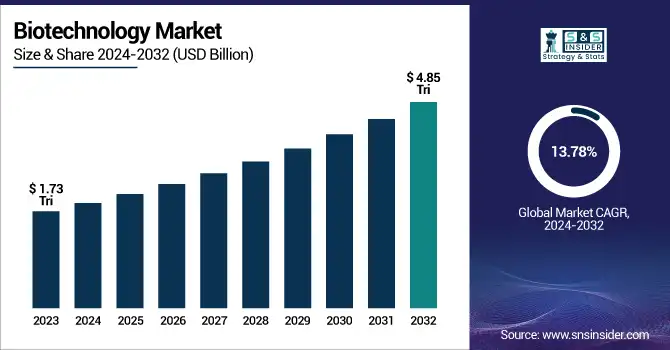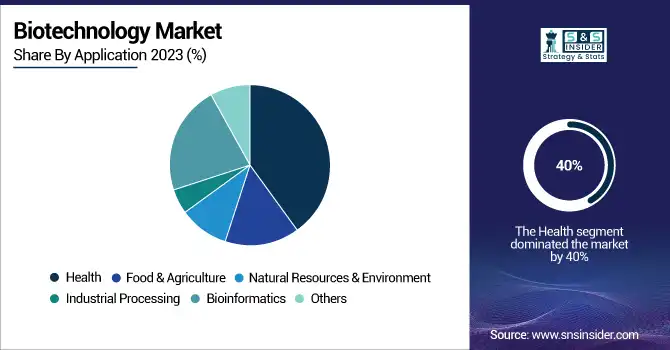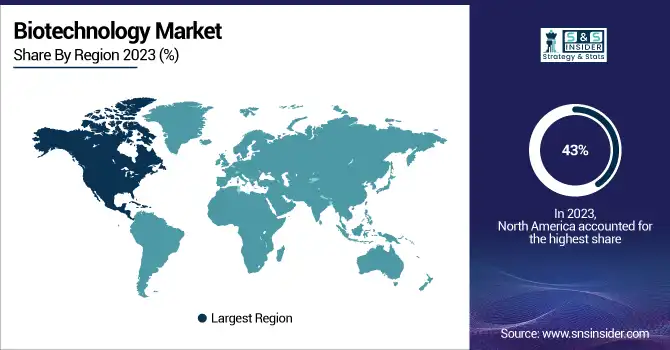Biotechnology Market Size, Trends & Growth Analysis:
The Biotechnology Market size was valued at USD 1.73 trillion in 2023 and is expected to reach USD 4.85 trillion by 2032 and grow at a CAGR of 13.78% over the forecast period 2024-2032.

Get More Information on Biotechnology Market - Request Sample Report
The biotechnology market is now one of the fastest-growing fields in contemporary science and business, progressing quickly due to genetic engineering, molecular biology, and computational biology innovations. Biotechnology plays a significant role in healthcare, with a focus on creating biopharmaceuticals, vaccines, and gene therapies. Biotechnology has revolutionized the pharmaceutical industry, making monoclonal antibodies and recombinant proteins common therapies for diseases like cancer, autoimmune disorders, and rare genetic conditions. The advancements in CRISPR gene-editing technologies are pushing further innovations, enabling scientists to fix genetic mutations directly. Government funding for biotechnology research in the U.S. is significant and increasing, showcasing the industry's importance in furthering medical and scientific understanding. In 2024, the National Institutes of Health (NIH) is at the forefront of this initiative, allocating around $47 billion overall and setting aside more than USD 5 billion specifically for biotechnology research across its diverse institutes. From its USD 12 billion budget, the National Science Foundation (NSF) allocates approximately USD 1 billion each year specifically towards the field of biological sciences. The Department of Defense (DoD) puts approximately USD 1.5 billion into biotechnology, specifically for bio-defense and advanced medical technologies, while the Department of Energy (DOE) dedicates about USD 600 million for bioenergy and environmental biotechnology research.
Biotechnology plays a critical role in agriculture, which is another essential sector. Genetically modified organisms (GMOs) have revolutionized agriculture methods by incorporating crops that can withstand pests, diseases, and extreme environmental conditions. This has resulted in increased crop productivity, decreased reliance on chemical pesticides, and improved land utilization. For instance, Bayer CropScience uses various innovative methods to apply biotechnology in agriculture. The company creates GM crops that have traits like pest and disease resistance as well as tolerance to environmental stress, resulting in increased productivity and decreased reliance on chemical inputs. Their seed technology focuses on developing seeds with better characteristics like resistance to drought and increased efficiency in nutrient utilization, frequently employing gene editing tools like CRISPR. Bayer CropScience further enhances biological crop protection through the creation of bio-based products that utilize natural organisms for pest and disease control, encouraging the use of sustainable farming methods. The agricultural biotechnology market also puts its focus on creating biofuels, enhancing food quality, and increasing nutrient content.
Biotechnology Market Dynamics
Drivers
-
The Impact of CRISPR-Cas9 and Genomic Advancements on Disease Treatment, Agriculture, and Bioinformatics.
Progress in genetic engineering and genomics has transformed the biotechnology field, offering effective methods for the accurate alteration of organisms on a genetic scale. CRISPR-Cas9 technologies have become widely popular because of their unmatched precision and efficiency in gene editing. These developments are allowing for major strides in fields like the treatment of diseases, agriculture, and industrial uses.
For example, CRISPR technology enables fixing genetic abnormalities causing illnesses, leading to personalized medicine. With the help of these technological advancements, gene therapy is becoming more popular for treating various conditions such as cancer, cystic fibrosis, and muscular dystrophy. In addition, genetic editing shows promise in farming for creating genetically modified crops that have better protection against pests, higher production, and improved nutritional value. The field of biotechnology is experiencing a rise in bioinformatics, which combines computational tools with biology to enhance comprehension of intricate genetic data. This integration enables scientists to examine large quantities of genomic data to pinpoint drug targets, comprehend disease mechanisms, and create novel therapeutic approaches.
-
The Surge of R&D Investments and Their Impact on Healthcare, Agriculture, and Environmental Sustainability.
The biotechnology sector relies heavily on research and development for creating new products and fostering innovation. Governments, private organizations, and venture capitalists are starting to realize the potential of biotechnology more and more, leading to increased investments in R&D efforts. This increase in funding is leading to the exploration of new biotechnological uses in areas like healthcare, agriculture, and environmental science. Investment in research and development in healthcare is driving the creation of new biologics, biosimilars, and cell and gene therapies. One area of extensive research is the use of biotechnology to produce monoclonal antibodies, which show promise in treating cancer, autoimmune disorders, and infectious diseases.
Biotechnology research and development in agriculture are resulting in the creation of genetically modified organisms (GMOs) that improve crop yield, boost resistance to pests and diseases, and decrease reliance on chemical fertilizers and pesticides. The rise of biofuels and bioplastics is also picking up pace, driven by the demand for eco-friendly options to replace fossil fuels. Additionally, there is a growing partnership between academic institutions and industry in the biotechnology market, resulting in the transformation of academic research into commercial products. The thriving ecosystem for biotechnology innovation is being created by the collaborative environment and favorable government policies and initiatives.
Restraints
-
High Costs and Regulatory Challenges of Biologics and Gene Therapies.
The biotechnology sector is known for its expensive research and development (R&D) expenditures, especially in fields such as pharmaceuticals and genetic modification. The expense of creating a new biotechnological product, like a biologic or gene therapy, can be extremely high because of the requirement for thorough clinical trials, regulatory authorizations, and manufacturing methods. For instance, the production of biologics necessitates the utilization of advanced cell culture methods, which are more intricate and expensive when compared to conventional chemical drugs. Furthermore, gene therapies require advanced technologies and highly skilled personnel to manipulate genetic material. The significant hurdle for biotech companies, especially startups and small enterprises, is the expensive price linked with these procedures. Additionally, the regulations governing biotechnology are strict, leading to extended approval procedures that also raise the costs of development. Companies are required to manage an intricate system of regulations, such as preclinical tests, clinical experiments, and post-market monitoring, which contribute to the financial strain.
Biotechnology Market Segmentation Insights
By Technology
DNA sequencing held a market share of 29% in 2023 primarily due to its crucial role in genomics and personalized medicine. This technology helps with identifying genetic changes linked to illnesses, assisting in creating specific treatments. It is widely used in diagnostics, drug development, forensics, and agriculture. The increase in the need for precision medicine, which customizes treatments based on individual genetic characteristics, has played a major role in the prevalence of DNA sequencing. Illumina, a major player in the industry, provides DNA sequencing systems such as the NovaSeq Series, commonly utilized for cancer genomics, rare disease research, and population-scale studies.
Nanobiotechnology is expected to grow at a faster rate during the forecast period because of its revolutionary effects on drug delivery, diagnostics, and regenerative medicine. The use of nanoparticles enhances drug delivery precision, decreases side effects, and improves imaging methods. Its incorporation with biomedicine provides creative answers for addressing illnesses on a molecular scale, particularly in cancer therapies and tissue engineering. For example, Pfizer's utilization of nanotechnology in medicine, specifically in their COVID-19 mRNA vaccine, demonstrates the promise of nanobiotechnology in targeted treatment.
By Application
The health led the market with a 40% market share fueled by growing needs for cutting-edge diagnostics, personalized medicine, and creative therapies. Biotechnology is utilized in healthcare for drug discovery, gene therapy, and producing biologics and vaccines. The industry is expanding due to an increase in elderly populations, an uptick in chronic illnesses, and advancements in medical research technology. Big companies like Amgen and Genentech have made a big impact in this area by providing innovative treatments and individualized healthcare options. For example, the progress made by Amgen in creating biological therapies for cancer and Genentech's improvements in targeted cancer treatments demonstrates the sector's influence.
The food and agriculture sector is accounted to have a faster growth rate during 2024-2032, due to rising global food requirements and the necessity for sustainable farming methods. Biotechnology is used in this area for genetically modifying crops, developing bio-pesticides, and improving soil health. Monsanto (currently under Bayer) and Syngenta are leading the way by creating genetically modified crops to enhance productivity and durability against pests. For instance, Monsanto's Bt corn contains a gene from Bacillus thuringiensis bacterium, which boosts pest resistance and raises agricultural productivity.

Biotechnology Market Regional Analysis
North America dominated in 2023 with a 43% market share because of its advanced healthcare system, considerable investment in research and development, and a large number of leading biotech companies such as Amgen, Biogen, and Gilead Sciences. The United States is at the forefront of revolutionary advancements in genetic engineering, personalized medicine, and bioinformatics. Canada plays a role in the advancement of biopharmaceuticals and agricultural biotechnology. Important areas of use consist of treatments, pharmaceutical research, and healthcare testing.
APAC is to experience rapid growth during the forecast period due to growing healthcare needs, higher investments in research and development, and a growing pharmaceutical industry. Nations such as China, India, and Japan play a significant role, with companies like WuXi AppTec and Biocon at the forefront. APAC's use of biotechnology extends to agricultural biotech, regenerative medicine, and vaccine production. Furthermore, the presence of favorable government policies like China's "Made in China 2025" program and an increase in clinical trials solidify APAC as a key biotech hub for future development.

Need any customization research on Biotechnology Market - Enquiry Now
List of biotechnology Comapanies and their related products:
-
AstraZeneca – Imfinzi
-
Gilead Sciences, Inc. – Yescarta
-
Bristol-Myers Squibb – Opdivo
-
Sanofi – Sarclisa
-
Biogen – Spinraza
-
Abbott Laboratories – FreeStyle Libre
-
Pfizer, Inc. – Ngenla
-
Amgen Inc. – Lumakras
-
Novo Nordisk A/S – Ozempic
-
Merck KGaA – Bavencio
-
Johnson & Johnson Services, Inc. – Darzalex
-
Novartis AG – Kymriah
-
F. Hoffmann-La Roche Ltd. – Hemlibra
-
Lonza – Cell Therapy Manufacturing Services
Recent Development in Biotechnology Industry
-
August 2023: Verve Therapeutics launches its first human clinical trial of a gene-editing therapy. This uses CRISPR technology to turn off a patient's PCSK9 gene, which plays a critical role in regulating cholesterol.
-
July 2023: Moderna has announced the development of a new cancer vaccine developed with Merck in Phase 2 clinical trials. mRNA-4157/V940 is a Moderna personalized cancer vaccine in use at Moderna that trains the immune system to recognize specific cancer mutations.
-
June 2023: Illumina announces their new sequencing technology which achieves whole-genome sequencing hitherto unprecedented. This new sequencing technology is expected to provide greater insight and higher accuracy thus completing the span within which genetic sequencing has reached.
| Report Attributes | Details |
|---|---|
| Market Size in 2023 | USD 1.73 trillion |
| Market Size by 2032 | USD 4.85 trillion |
| CAGR | CAGR of 13.78% From 2024 to 2032 |
| Base Year | 2023 |
| Forecast Period | 2024-2032 |
| Historical Data | 2020-2022 |
| Report Scope & Coverage | Market Size, Segments Analysis, Competitive Landscape, Regional Analysis, DROC & SWOT Analysis, Forecast Outlook |
| Key Segments | • By Technology (Nanobiotechnology, Tissue Engineering & Regeneration, DNA Sequencing, Cell-based Assays, Fermentation, PCR Technology, Chromatography, Others) • By Application (Health, Food & Agriculture, Natural Resources & Environment, Industrial Processing, Bioinformatics, Other) |
| Regional Analysis/Coverage | North America (US, Canada, Mexico), Europe (Eastern Europe [Poland, Romania, Hungary, Turkey, Rest of Eastern Europe] Western Europe] Germany, France, UK, Italy, Spain, Netherlands, Switzerland, Austria, Rest of Western Europe]), Asia Pacific (China, India, Japan, South Korea, Vietnam, Singapore, Australia, Rest of Asia Pacific), Middle East & Africa (Middle East [UAE, Egypt, Saudi Arabia, Qatar, Rest of Middle East], Africa [Nigeria, South Africa, Rest of Africa], Latin America (Brazil, Argentina, Colombia, Rest of Latin America) |
| Company Profiles | AstraZeneca, Gilead Sciences, Inc., Bristol-Myers Squibb, Sanofi, Biogen, Abbott Laboratories, Pfizer, Inc., Amgen Inc., Novo Nordisk A/S, Merck KGaA, Johnson & Johnson Services, Inc., Novartis AG, F. Hoffmann-La Roche Ltd., Lonza |

